

Joe Rogan & Gad Saad - Men, Women, Money and Mating. Future - Why it pays to be grumpy and bad-tempered. This story is featured in BBC Future’s “Best of 2016” collection.

Discover more of our picks. On stage he’s a loveable, floppy-haired prince charming. 1973%20A%20Study%20of%20Prisoners%20and%20Guards,%20Naval%20Research%20Reviews. German government creates online sex manual for immigrants. Anselm Strauss: The Concept of Attitude in Social Psychology. What caused Haiti’s cholera epidemic? The CDC’s museum knows but won’t say. Last Friday, a friend doing research at the U.S.

Centers for Disease Control and Prevention in Atlanta sent me a photo of a display at the CDC’s in-house museum. She thought I’d be interested because it had to do with the cholera epidemic in Haiti, which I lived through at its beginning and have been reporting on ever since. She was right. It blew my mind: Farren Yero To understand what’s so insane about it, you need to know a little about two of the maps in that image and the CDC’s history with the epidemic. Anselm Strauss: The Concept of Attitude in Social Psychology. Wilhelm Maximilian Wundt. 1.

Biographical Timeline 2.
History of Social Psychology. Social Psychology Reading Suggestions. (and others) Psychology and the Status Quo / Critical Psychology Albee, George W. (1986) Toward a Just Society: Lessons From Observations on the Primary Prevention of Psychopathology.
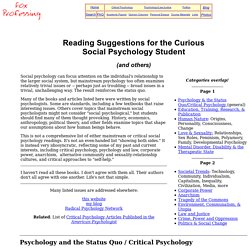
American Psychologist, 41, 891-898. Archibald, W. P. (1978). Armistead, Nigel (Ed.). (1974). Bakan, David (1967). Baritz, L. (1974). Billig, M. (1982). Braginsky, B. Social Psychology Links by Subtopic. Attitudes and Social Cognition: Persuasion and Propaganda: Marketing and Selling: MarketingPower.com (American Marketing Association) National Association of Sales ProfessionalsMarketing Research AssociationSelling Power (tools, skills, and resources for sales professionals) Internet Marketing Center (focuses on Internet-based marketing)
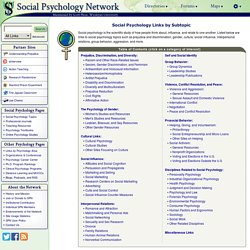
Social Psychology Teaching Resources.
Social Psy - Decisions & Reasoning. Social Psy Quizzes & Experiments. What Other People Think. Physical Environment, Dishonesty Linked In New 'Embodied Cognition' Research. Laud. Laud Humphreys, a sociologist, recognized that the public and the law-enforcement authorities hold highly simplistic stereotyped beliefs about men who commit impersonal sexual acts with one another in public restrooms.
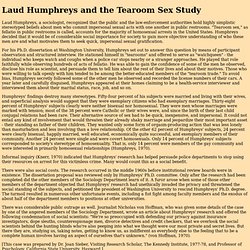
"Tearoom sex," as fellatio in public restrooms is called, accounts for the majority of homosexual arrests in the United States. Humphreys decided that it would be of considerable social importance for society to gain more objective understanding of who these men are and what motivates them to seek quick, impersonal sexual gratification. For his Ph.D. dissertation at Washington University, Humphreys set out to answer this question by means of participant observation and structured interview. Common method biases in behavioral research: ... [J Appl Psychol. 2003. Law of attraction. The law of attraction is the name given to the belief that "like attracts like" and that by focusing on positive or negative thoughts, one can bring about positive or negative results.[1][2][3][4] This belief is based upon the idea that people and their thoughts are both made from "pure energy", and the belief that like energy attracts like energy.[5] One example used by a proponent of the law of attraction is that if a person opened an envelope expecting to see a bill, then the law of attraction would "confirm" those thoughts and contain a bill when opened.
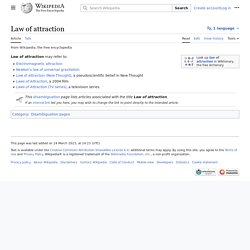
A person who decided to instead expect a cheque might, under the same law, find a cheque instead of a bill.[6] Although there are some cases where positive or negative attitudes can produce corresponding results (principally the placebo and nocebo effects), there is no scientific basis to the law of attraction.[7] History[edit] The book The Science of Getting Rich by Wallace D. Napoleon Hill published two books on the theme. Research Methods. Exploding the Self-Esteem Myth. 6 Mind-Blowing TED Talks About Psychology & Human Behavior. The human brain is complex and confusing, which explains why human behavior is so complex and confusing.

People have a tendency to act one way when they feel something completely different. How many times have you been asked “What’s wrong?” Only to answer “Nothing,” even though something truly was wrong? Personally, I’ve lost count. Humans are strange creatures, indeed. And yet, the craziness of human behavior doesn’t end there. Class Assignments: Social Psychology. Make your own IAT - FreeIAT lets you or your students create your Implicit Association Tests.
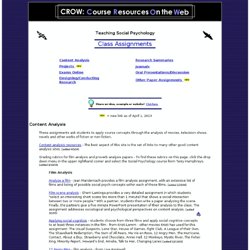
[added 4/01/13] Attraction and Relationships - Now that the excellent Science of Relationships site has been around a bit (at least in Internet time), it has accumulated a number of good resources for teaching. The site creators have graciously compiled some of those resources and assignments at the link above. [added 12/12/12] Changing the world, $5 at a time, through a grant assignment - This assignment, by Jennifer Hunt, won the 2012 Social Psychology Network Action Teaching Award. A public education project on intersecting identities - Kim Case won an honorable mention in the 2012 Social Psychology Network Action Teaching Award competition with this entry: "Intersectionality is a feminist sociological theory that describes how biological, social, and cultural categories such as gender, race, class, ability, and other dimensions of identity interact to create social inequality.
Syllabus - Psychology I. Instructor: Linda Elder (Text: Coon, D. (1992) Introduction to Psychology.
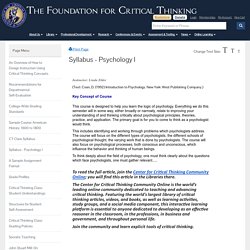
New York: West Publishing Company.) Key Concept of Course This course is designed to help you learn the logic of psychology. Everything we do this semester will in some way, either broadly or narrowly, relate to improving your understanding of and thinking critically about psychological principles, theories, practice, and application. The primary goal is for you to come to think as a psychologist would think. This includes identifying and working through problems which psychologists address.